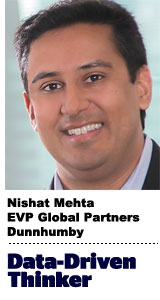 “Data-Driven Thinking” is written by members of the media community and contains fresh ideas on the digital revolution in media.
“Data-Driven Thinking” is written by members of the media community and contains fresh ideas on the digital revolution in media.
Today’s column is written by Nishat Mehta, executive vice president of global partnerships at dunnhumby.
Mobile phone owners are using fewer apps, Deloitte recently reported, and 90% have never bought an app or other smartphone content. That has some industry observers concerned.
But that isn’t the whole story. Smartphone ownership continues to grow, and users are spending more of their digital time on mobile, especially in apps. How to explain these separate, seemingly contradictory trends?
In short, the mobile app economy is maturing. Rather than fearing that the app economy is on life support, or headed that way, it seems logical that people are spending more time on mobile apps but focusing on ones that come preloaded on their phones, plus a chosen few, indispensible apps.
The Internet in general shows signs of these trends, too, yet no one is concerned about its future. People are being choosy and shopping with fewer online retailers, and most Internet users don’t pay for content. Yet the Internet economy continues to boom with an ever-concentrating set of ecommerce retailers, such as Amazon, advertising – which is nearing TV spending – and subscription revenues, such as The New York Times, which has more than 500,000 paying digital subscribers. The same economic realities that led a butcher, baker and wine shop to unify under the umbrella of a supermarket apply to the online and mobile spaces, too.
As with most products, as apps improve they tend to accrue customer loyalty and add functionality, which naturally results in using fewer apps, but using them more heavily. I once relied on eight different news apps to keep up on technology, politics, finance and more. Now I use Yahoo News Digest for a quick overview of the day’s events and, for more in-depth news, Zite, a news aggregator that produces a personalized newspaper for me, based on how I rate individual articles. I’d bet that both Yahoo’s and Zite’s developers are working on incorporating the other’s functionality in order to get me – and millions of others – to delete their competitor’s app.
Additionally, those who never spend money on mobile content still receive ads that support the app economy. As mobile apps often deliver higher CPMs than other digital media, better targeting and major opportunities for native ad units, even users who never pay still benefit the app economy and are more valuable than those same users on ad-supported desktop websites. As people get more comfortable with location-based advertising, more apps will become free to the consumer and, instead, monetize through targeted advertising. This is identical to the trend for Internet publishers as online behavioral targeting has exploded.
Let’s not forget the coming avalanche of new hardware sensors, from fitness trackers and smart watches to Internet-connected thermostats and light bulbs. Thanks to wearable computing and the Internet of Things, apps and app usage related to these areas will similarly explode. We’ll do nothing less than redefine what we mean by apps. My wife won’t green-light the installation of connected light bulbs in our home if she has to unlock her phone, open an app and start tapping just to turn them on. Instead, voice controls, lock-screen commands and gestures and security will improve, or she will use a mini-app on her Apple Watch to do this.
On this last point, Google Fit for Android and Apple’s HealthKit represent a microcosm of the future of the app economy. As more apps are developed in a single category, Android and iOS will eventually include a native app to replace or consolidate them. But while these health platforms and wearables may make some features of certain third-party apps obsolete, they create a market for an even bigger category of apps to leverage health and fitness data. These data-driven applications will become compelling enough that either consumers will pay for the apps or advertisers will pay to access the data in order to reach consumers who’ve given permission to be targeted (or somewhere in between). In all of these scenarios, the app economy is strengthened.
I’m realistic about threats to the app economy, the biggest being the consolidation that Deloitte’s study highlights. Better discovery capabilities will be crucial to addressing this. Today’s app store search algorithms are like using Alta Vista in the 1990s or the maddening on-screen guides from most cable providers. They point us toward a few predictable names and much value goes undiscovered. Google’s search engine, which allowed pages to be ranked by how many times others linked to them, and AdWords were critical to enabling smaller Internet sites to compete with the bigger ones.
A similarly crowdsourced app discovery engine would increase diversity by giving a leg up to smaller developers that don’t have massive marketing budgets. If only there existed a company that both owns an app store and knows something about search.
While Deloitte’s study confirmed that the app economy as we know it is maturing, it has a long way to grow. I wouldn’t bet against it but will watch with excitement what comes next.
Follow Nishat Mehta (@nishatmehta), dunnhumby (@dunnhumby) and AdExchanger (@adexchanger) on Twitter.













